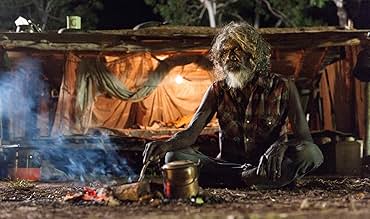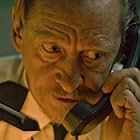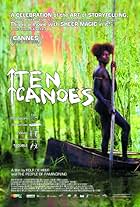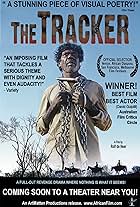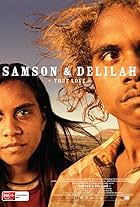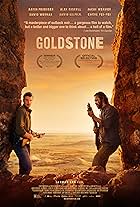IMDb RATING
7.3/10
2.8K
YOUR RATING
Displeased with the intervention of whitefella laws, Charlie takes off to live the old way and sets off a chain reaction of enlightening difficulties.Displeased with the intervention of whitefella laws, Charlie takes off to live the old way and sets off a chain reaction of enlightening difficulties.Displeased with the intervention of whitefella laws, Charlie takes off to live the old way and sets off a chain reaction of enlightening difficulties.
- Awards
- 14 wins & 16 nominations
Bobby Bunungurr
- Bobby
- (as Bobby Bununggurr)
Michael Dawa
- Micky
- (as Michael Dawu)
J.B. Williams
- Gaz's Sidekick
- (as Josh Williams)
- Director
- Writers
- All cast & crew
- Production, box office & more at IMDbPro
Storyline
Did you know
- TriviaCharlie keeps a beloved photograph of himself and other dancers performing at the opening of the Sydney Opera House, dancing before Queen Elizabeth. In reality, David Gulpilil who plays Charlie was indeed a 20 year-old dancer at the opening of the Sydney Opera House who did in fact perform before the Queen, just like his character.
- ConnectionsFeatured in Celebrating Australian Screen Culture (2020)
Featured review
At the heart of Charlie's Country, the third collaboration between Dutch-Australian director Rolf de Heer and his co-writer and famed aboriginal star David Gulpipil is an engaging and compelling performance from the latter filmed on location in the Australia's Northern Territory. Gulpipil, with his weathered features and charismatic presence is forever watchable, especially in the first half of the film, which is mainly located around "his country" on the peripheries of a remote community. It is here where we find him at the film's outset experiencing a kind of indigenous "mature life crisis".
Charlie is becoming increasingly unhappy with his position in the community. Fed up by the demands and expectations created by the continual "humbugging"of himself by extended family and community members, he finds he gets short shrift from government employees, when seeking assistance (in the form of a house mind you). He also feels his personal liberties are being infringed upon by laws and regulations he doesn't fully understand and certainly hasn't consented to, imposed by the mainstream white culture, which also fails to give him due credit for the services he provides in the form of requested tracking tasks and hunting advice. He decides to leave the community and go and live traditionally in his country by himself, but naturally things don't necessarily turn out as planned.
Gulpipil has said the story he wrote with de Heer is semi-biographical, being based on his experiences living in and around the filming locations, which by the way, are wonderfully captured through the lens of cinematographer Ian Jones. That may be so, but as one who has actually lived and worked in these same communities for a good part of my life, I found the continual depiction of stereotypical racist and near-racist behaviour by the white supporting characters both tiresome, factually incorrect and very much an indictment of lazy writing on the part of de Heer and Gulpipil, especially considering the story is well and truly set in contemporary Australia.
de Heer has a long tradition of featuring racist bullying policeman in his indigenous-focused films and he carries on the tradition in Charlie's Country, where we see the local police in Charlie's community, as well as in Darwin, the capital city, barely hiding their contempt for those of indigenous background. However completely disregarded is that the police force these days has a significant aboriginal component itself, especially notable in remote communities. Ludicrously, we even have one of the cops from Charlie's remote community, played by Luke Ford, magically pop up in Darwin hundreds of kilometres away, so he can violently arrest Charlie and reinforce again these aggressive racial undertones.
Similarly the derogatory language and behaviours displayed unilaterally by the doctors, judges and public servants (apart from a solitary female social worker) put the lie to any cultural awareness programs continually adopted and implemented by members of those professions and by and large valued by Australian society.
This is a movie which whilst imparting an important tale worthy of attention, utilises absolutely no finesse in many characterisations. There are no greys, no degrees of ambivalence. Every thing is unfortunately just black and white, where the white is seen as overbearingly oppressive and both uncaring and damaging of the black culture. Nothing could be further from the truth.
Charlie is becoming increasingly unhappy with his position in the community. Fed up by the demands and expectations created by the continual "humbugging"of himself by extended family and community members, he finds he gets short shrift from government employees, when seeking assistance (in the form of a house mind you). He also feels his personal liberties are being infringed upon by laws and regulations he doesn't fully understand and certainly hasn't consented to, imposed by the mainstream white culture, which also fails to give him due credit for the services he provides in the form of requested tracking tasks and hunting advice. He decides to leave the community and go and live traditionally in his country by himself, but naturally things don't necessarily turn out as planned.
Gulpipil has said the story he wrote with de Heer is semi-biographical, being based on his experiences living in and around the filming locations, which by the way, are wonderfully captured through the lens of cinematographer Ian Jones. That may be so, but as one who has actually lived and worked in these same communities for a good part of my life, I found the continual depiction of stereotypical racist and near-racist behaviour by the white supporting characters both tiresome, factually incorrect and very much an indictment of lazy writing on the part of de Heer and Gulpipil, especially considering the story is well and truly set in contemporary Australia.
de Heer has a long tradition of featuring racist bullying policeman in his indigenous-focused films and he carries on the tradition in Charlie's Country, where we see the local police in Charlie's community, as well as in Darwin, the capital city, barely hiding their contempt for those of indigenous background. However completely disregarded is that the police force these days has a significant aboriginal component itself, especially notable in remote communities. Ludicrously, we even have one of the cops from Charlie's remote community, played by Luke Ford, magically pop up in Darwin hundreds of kilometres away, so he can violently arrest Charlie and reinforce again these aggressive racial undertones.
Similarly the derogatory language and behaviours displayed unilaterally by the doctors, judges and public servants (apart from a solitary female social worker) put the lie to any cultural awareness programs continually adopted and implemented by members of those professions and by and large valued by Australian society.
This is a movie which whilst imparting an important tale worthy of attention, utilises absolutely no finesse in many characterisations. There are no greys, no degrees of ambivalence. Every thing is unfortunately just black and white, where the white is seen as overbearingly oppressive and both uncaring and damaging of the black culture. Nothing could be further from the truth.
- spookyrat1
- Jul 13, 2019
- Permalink
- How long is Charlie's Country?Powered by Alexa
Details
- Release date
- Country of origin
- Official site
- Languages
- Also known as
- El país de Charlie
- Filming locations
- Production companies
- See more company credits at IMDbPro
Box office
- Gross US & Canada
- $42,937
- Opening weekend US & Canada
- $5,340
- Jun 7, 2015
- Gross worldwide
- $658,179
- Runtime1 hour 48 minutes
- Color
- Sound mix
- Aspect ratio
- 2.39:1
Contribute to this page
Suggest an edit or add missing content



